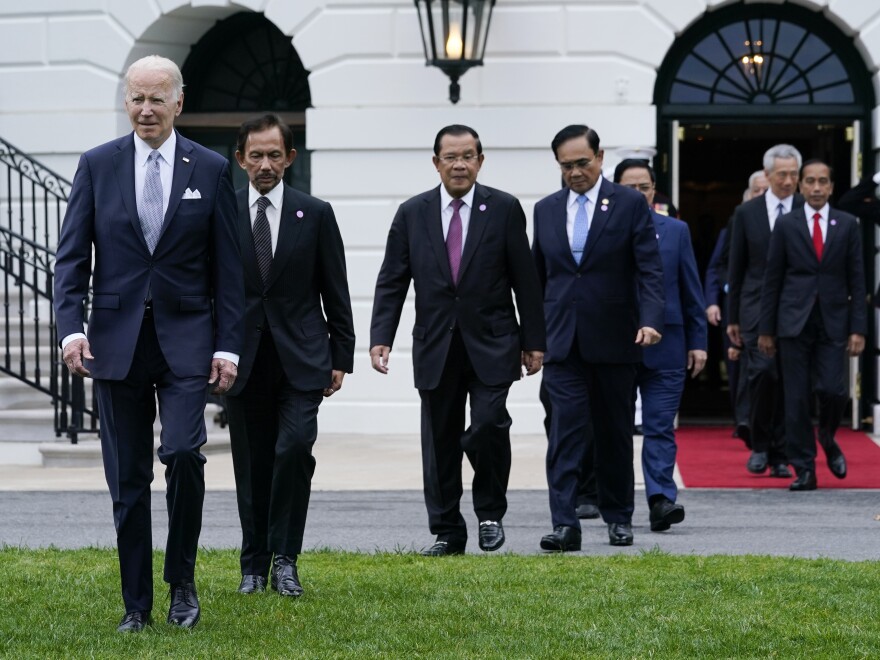WASHINGTON — President Joe Biden is looking to nudge southeast Asian leaders to be more outspoken about Russia's invasion of Ukraine, but the issue continues to be a delicate one for many members of the region's 10-country alliance with deep ties to Moscow.
Biden welcomed leaders from Association of Southeast Asian Nations to White House on Thursday night for an intimate dinner to kick off the two-day summit, the first meeting of the group to be held in Washington in its 45-year history.
The White House is also trying to demonstrate that it is stepping up in the Pacific even as the administration has been focused on the war in Ukraine. It announced that the United States would commit to more than $150 million in new projects to bolster Southeast Asia's climate, maritime and public health infrastructure.
But Biden knows that finding consensus with ASEAN members on the Russian invasion could prove to be difficult.
White House press secretary Jen Psaki on Thursday said Ukraine would be on the agenda for the leaders' talks, but she couldn't make a prediction on whether the group would touch on the Russian invasion in the summit's communique.
"I will say that a number of the ASEAN participants have been important partners in calling out the aggressive action of Russia," she said, and "in participating and in supporting sanctions and, certainly, abiding by them."
Some ASEAN members — Vietnam, Myanmar, and Laos — for years have depended on Russia for military hardware. With the exception of Singapore — the only member of the 10-member group to impose direct sanctions against Moscow — the alliance has avoided criticizing President Vladimir Putin or Russia's prosecution of the war.
Indonesia has been guarded in its public comments on invasion and, as has the Philippines, made clear it won't impose sanctions against Russia. Thailand joined a United Nations vote against the invasion of Ukraine, but has maintained a position of neutrality in the war.
Leaders were scheduled to hold formal talks at the State Department on Friday, and Biden was scheduled to address the group.
The ASEAN nations include Brunei, Cambodia, Indonesia, Laos, Malaysia, Singapore, Thailand and Vietnam. The top leaders from ASEAN member Myanmar were barred from attending, while outgoing Philippines President Rodrigo Duterte dispatched Foreign Affairs Secretary Teodoro Locsin Jr. to represent his government.
The summit comes before Biden's trip next week to South Korea and Japan — his first visit to Asia as president. He'll hold talks with those two countries' leaders and also meet during the trip with leaders from the Indo-Pacific strategic alliance known as the Quad, made up of Australia, India, Japan and the U.S.
Biden has tried to put greater focus on improving relations with Pacific nations in the early going of his presidency, vewing a rising China as the most threatening economic and national security adversary to the United States.
But his attempt at an recalibrating U.S. foreign policy has been complicated by the most serious fighting in Europe since World War II.
The new U.S. investment in ASEAN nations announced at the start of the summit on Thursday includes $40 million for clean energy infrastructure, $60 million for a new regional maritime initiative and $6 million to accelerate digital development in the region.
The White House also announced that Johns Hopkins University's School of Advanced International Studies will launch a privately funded institute for rising leaders from ASEAN nations that will bring mid-career public sector officials to the United States for leadership training.
ASEAN has barred Myanmar — in crisis since the army ousted the elected government of Aung San Suu Kyi in February 2021 — from sending all but nongovernmental leaders to ASEAN meetings.
The Biden administration condemned the military coup that led to the ouster of Suu Kyi. She was convicted by a military court last month of corruption and sentenced to five years in prison in the first of several corruption cases against her. Suu Kyi has denied the charges.
Kurt Campbell, coordinator for Indo-Pacific Affairs on the White House National Security Council, said the administration expects the private talks will be "direct, polite, but maybe a little bit uncomfortable at times" as the U.S. and ASEAN members are not on the same page on all issues.
He added the administration wants to see the group "play a more deeply engaged role in the critical diplomacy about next steps" in Myanmar.
Copyright 2022 NPR. To see more, visit https://www.npr.org.




